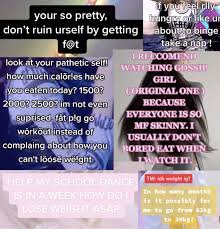Around the world, young boys and girls are struggling from the effects of social media. The negative influence of social media apps is worsening the mental state of fragile teens, especially the ones who are on the platforms Instagram or TikTok.
These teenagers are also students in high schools across America where 1 in 5 kids experience bullying of some kind. Sitting in a classroom for over six hours a day to then go home and see unrealistic standards on social media is not easy. Putting these negative perceptions and fake realities into your mind may affect how focused and engaged you are in the classroom as well.
Senior Emily Kelley expresses “social media is toxic in terms of body image because it creates a fake highlight reel of what the perfect body is supposed to look like, and it shames anyone outside of that standard. These standards make coming to school more challenging because you always feel like you are being judged based on your appearance.”

Based on a report conducted by the Wall Street Journal, TikTok is presenting young teenage girls with algorithms surrounding weight loss, gambling and drugs. 13 year olds should not be exposed to these ideas, and they definitely should not be participating in the trends that were mentioned. The bots that registered to the young girls found over 33,000 videos that pertained to weight loss, purging, and unhealthy eating habits.
¨The beauty standards on social media are so hard to achieve unless you restrict your food, which is pro-ED¨ Lyla Ingalls states. ¨Many influencers endorse health products to young audiences that are highly impressionable, and this may feed into disordered eating, but at the end of the day, these platforms only care about making money¨.
Similarly, sophomore Maeve Curtin responds “I feel like every-time you open your phone, no matter what social media platform you’re on, you can always find something that its goal is to make your body or any part of you look better. At first it’s intriguing, but after years and years of being on social media, I feel like it gets you bogged down so that all you think about is how you can improve yourself. The initial goal of social media was to allow people to explore their own creativity, but now it promotes unrealistic standards and only encourages creators who are conventionally attractive.”
Because young girls only see skinny and petite influencers promoted on social media, eating disorders have become a normal occurrence in our society. When teens see images of girls with “the perfect body”, the only thing they desire is to look the same way. Weight loss pills and at home remedies have been advertised for years, and they have made their way onto teen social media platforms. Everytime you scroll through TikTok´s For You Page, at least ten videos will pop up of people exercising, trying out new pills or diets, looking at their bodies in the mirror, or completing a weight loss challenge. Although many of these videos have been removed from the platform, they are being replaced by new ones.
Ms. Cleary, the psychology teacher at OA believes that “social media has led to a lot of teenagers and adults experiencing disordered eating patterns. You see people with toned bodies posting about diets they have gone through that eliminate or cut our major food groups. This person is not a registered dietitian and probably trying to convince you to buy a product they are sponsoring. You start to believe it is healthy to eliminate a food group like carbohydrates, which actually are the body’s main source of energy. This model will not picture the brain fog she experiences at school or work because her brain is lacking energy. You will not see her feeling frustrated while going out for dessert with her friends and having to skip out on ice cream. You will not see her taking a thousand photos just to get the one picture that accentuates her abs. These undocumented moments will convince a person to also cut out carbs and think they are weak when they can’t sustain that lifestyle. This will lead their self-esteem to decrease to an even lower point. Again, this cycle is hard to avoid when you’re seeing these images repeatedly throughout the day on your phone.”
Oliver Ames prides itself on being an inclusive environment for all students and staff, and for the most part, that is true. On the flip end, some students are mindless about the things that they say in person and online, which has caused insecurities to rise amongst others. Students need to be more mindful about what they say and who they say it to because you never know what someone is going through.

Senior Kate Mclaughlin recalls “nobody has ever said anything directly about my appearance, however, I have heard some jarring things said between people in school that were so shocking I couldn’t help but think about it for the rest of the day. I will never forget the day I heard somebody at lunch say another girl on social media was not pretty “because you couldn’t see her ribcage,” which goes down to this day as one of the most unhealthy things about body image I have ever heard.”
Always try to remember that your looks do not define who you are. Looks do not determine your worth, and it is okay to not fit society’s beauty standards. If you are stressing about entering school because of how you look, please remember that the opinions of others will not matter in a few years. Live your life and try to ignore the negative comments and diet culture circulating on social media.
